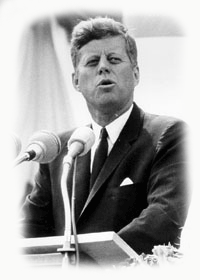KENNEDY DIED I
By Jim Massey [massey_j@firn.edu]

|
KENNEDY DIED I By Jim Massey [massey_j@firn.edu] |

|
It wasn't hard to find: right on the east end of downtown. We parked our car and walked to the plaza, which was full of reddish plants, a statue of Mr. Dealey, and a plaque reminding readers (if anyone needed reminding) of the assassination. We stopped for a moment and looked out over the road where the motorcade had been, then walked on to the Book Depository.
The Depository building is still standing, and the sixth floor is now a gallery of sorts, with displays of photographs, TV and movie footage on special screens, mementoes and newspaper clippings. In one corner, an ABC News radio bulletin of the shooting plays over and over, right above a teletype machine printing the announcement.
(I was in fourth grade, and we had just finished seeing a film. I was taking the projector cart back to the storage room, along with the teacher of the other fourth-grade class in our New Jersey school. She turned to me and said, "Do you know that the President has been shot?" I said I didn't know, and wondered if she was joking.)
Near the teletype machine is the corner where Oswald had crouched with his rifle. The book boxes are there, set up just as they had been that day. The corner is protected by a plastic pane, but anyone can look out of the next window and see how easy it was to shoot someone coming up the road. Nearby, the TV tape keeps playing: again and again, Walter Cronkite announcing the death of President Kennedy.
(When I walked in the front door, the television in the living room was on, the volume turned up louder than usual. Cronkite was trying to talk. My mother was working in the kitchen. My older sister was crying.)
The three of us on the sixth floor have split up, but occasionally we see each other. The lady is trying not to cry. The man is trying not to cry. I am trying not to cry. I wonder if I am as obvious as they are.
(My mother never cries. My father, a Defense Department electronics technician, wonders if we'll go to war. Outside, no one is walking, or playing, or driving.)
In a mini-theater with a few benches, a film of the events surrounding the funeral is showing. I am alone, watching. Jacqueline Kennedy and Caroline kneel before the casket and kiss it. A wandering thought: was she thinking of the times he cheated on her? Would my parents have voted for him in 1960, if they had known what we know?
(The funeral procession is coming down Pennsylvania Avenue on our living room TV set. I am glued to the set, transfixed by what I see, unable to speak or get up. The rest of the family goes about their business.)
A guest book is open for comments at the end of the display. I look at the pages: a number of people have written, including two in Japanese, which I cannot read very well. It seems Japan mourned for Kennedy just as America had; our family was to move there four years later, but I had never known.
(It's Tuesday, the day after the funeral. I ask my mother if anything will be different now that Kennedy is gone. She says that most things will be the same.)
Nothing has been the same since that day twenty-eight years ago. He may have had all the undesirable traits modern historians tell us and more, but our modern politics of constant character scrutiny has taught us that a politician who can't do anything bad probably can't do anything at all. Kennedy was able to make a whole nation dream great dreams, then work and sacrifice to make them come true. No one has done it since.
Something of America died with Kennedy. Something of me died with Kennedy. I cried when he died, for him. Walking outside the Book Depository and standing right where he was shot, I wanted to cry again: not for him, but for my country, and for me.
Return to the Day Kenndy Died Menu Click here